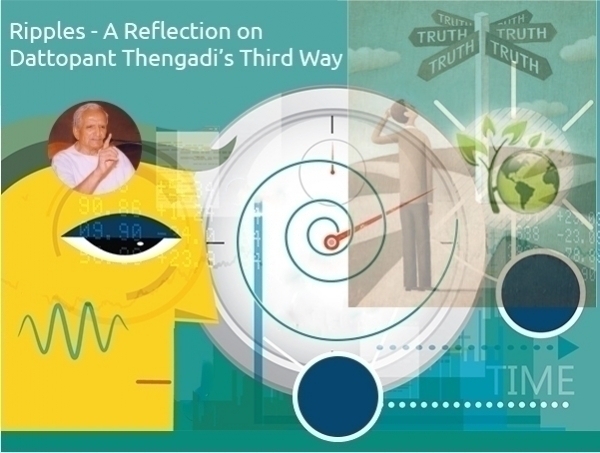Ripples A Reflection On Dattopant Thengadi's Third Way Part 51: South-South co-operation
02 Aug 2022 10:00:42
I have been reflecting in my own way on Dattopant Thengadi Ji's Third Way. I present these small "ripples" that it has caused in my mind in a series. I am glad it has found its resonance in many thinking minds alike. I hope the readers have read the earlier article in the series before moving ahead.
Recession in the developed countries, speedy growth of countries from south and complementarities resulted in South-South co-operation. (In 1978 United Nations established a unit, its roots may be traced back. This resulted in a large number of knowledge, expertise and technology exchanged for mutual benefit.)
The Centre- periphery theory by Raul Prebisch provided the basis. (An Argentina- born economist,1901-1986, the theory was used as a tool to analyze economic and financial phenomena) The theory recognized the differentiation of the economic structure of the nations at the center and at the periphery. The developed countries were at the center and the developing countries at the periphery. This helped to comprehend the needs of the developing countries. He strongly supported co-operation among periphery countries.
The report of the United Nations Industrial Development Organisation (1985) noted that policies of developed nations for recession worked negatively on developing nations. It further stated that there were a number of opportunities for increasing trade between south regions. In 1992 it observed a rising percentage of this trade. Though its share in the world is not very impressive.
South-South commission at the initiative of Malaysian Prime Minister Mahathir Mohammad was established in 1987 to "resist the moves of the dominant countries, to serve the aspirations of all people".
The global South countries wanted to use their collective resources effectively. All wanted to 'arrive at a global consensus on the new international system '. Dr Manmohan Singh was appointed secretary general.
"The growth they did not want to be just a by-product of the growth of the North. Sustained rural development, raising the productivity and income of small landholders was focused."
South-South co-operation was essential to get collective weight, balancing power, and effective say. Global South has three-quarters of humanity but were the sufferers on innumerable fronts like the economy, industries, agriculture, energy, and many more. (Dattopant has given a detailed description that makes us aware of its gravity.)
A systematic study and relevant forums were formed to support the objectives. "The most dangerous thing was", as noted by Dr. Salah-al- Shaikhly (served as Iraqi Ambassador to the UK and the Republic of Ireland) "to wait for the industrial countries to solve problems".
Frances Stewart (a professor emeritus of development economics and director of the Centre for Research on Inequality, Human Security and Ethnicity , University of Oxford.) observes that ' the game which governs North-South economic relations have been developed almost exclusively from Northern perspective '.
Even "A Commonwealth Group of Experts", established in 1989 observed that the main elements of change affected the growth of developing countries.' ' external indebtedness was a barrier to economic growth and spreading poverty. (instead)
(The article was published in the weekly 'Organiser' in 1994)
